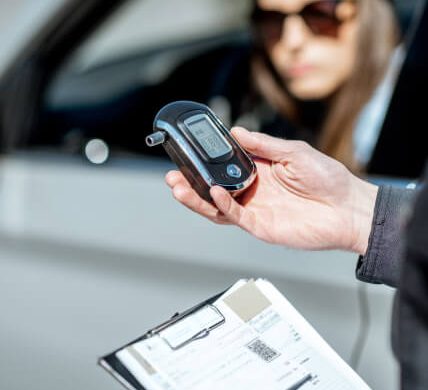DUI in Georgia
Know the Law About Georgia DUIs
More and more, states are becoming stricter on drunk driving, and Georgia is no different. Below, we outline what you can expect to face if you’re charged with a DUI in Georgia, including how a DUI charge will affect your auto insurance premium.
In Georgia, the BAC limits for legal intoxication are:
- 0.08 grams for drivers 21 or older
- 0.02 grams for drivers under 21
If you’re driving a commercial vehicle, then the BAC limit is stricter at 0.04 grams.
Remember that a BAC level of 0.02 grams is equivalent to about one unit of alcohol (one glass of beer of wine, one shot of liquor, etc.).
A police officer who suspects someone is driving under the influence will most of the time pull the driver over for a traffic violation such as speeding or an illegal turn. If the officer smells alcohol or hears slurred speech, then they may further investigate a DUI violation. In addition, police officers in Georgia can establish probable cause to pull you over from other factors, such as:
- Stumbling to your car
- Weaving lanes
- Driving too slowly
- Being involved in a car accident (even when you’re not at fault)
Getting Pulled Over for DUI in Georgia
If you’re stopped by a police officer who suspects you of driving under the influence, the officer may ask you to take a chemical (breath) test to determine your BAC. Note that you have the right to refuse a chemical test. However, the police officer may ask a judge for a search warrant to do a blood test. While this may sound like an unlikely scenario, many roadblocks in Georgia are staffed by an on-site judge who can issue the warrant in a matter of seconds. Once that happens, then you will need to go with the officer to a nearby hospital, jail, or fire station for a blood draw.
If you are convicted of a DUI in Georgia, then your license will likely be suspended. After a certain period of time, you can get it reinstated if you file an SR-22 certificate of financial responsibility. An SR-22 is a form that your car insurance company files with the Georgia Department of Driver Services (DDS) to prove that you have adequate car insurance coverage.
Depending on the circumstances, you may be allowed a restricted license that allows you to drive only to work and school. In this case, you would need to file the SR-22 form before receiving your restricted license. You will also need to install an ignition interlock device (IID) in your car. An IID is a portable breathalyzer that connects to your car’s ignition. Each time you want to start the vehicle, you will need to blow into the IID to verify that you haven’t been drinking.
How Does a DUI in Georgia Impact Your Insurance?
Just like any negative event on your driving record, DUIs have a significant effect on your auto insurance rate. If you are charged with a DUI and have to file an SR-22, then you can expect your annual insurance premium to go up by at least $1,200 on average. In addition, you will need to pay a filing fee each time your insurance company submits the SR-22 to the Georgia DDS. Also, remember that if you’re caught violating other traffic laws connected with your DUI — for instance, speeding, running a red light, or driving on the wrong side of the road — then those violations will impact your insurance premium too.
If your license is suspended or you need to file an SR-22 form, your insurance company may cancel your policy. This is because not all auto insurance companies cover high-risk drivers. If this happens, then it’s time to shop around for a new auto insurance company that will file SR-22 forms and cover you.
Typically, you will need to file an SR-22 form for three years in Georgia. In most cases, your insurance rates will begin to go down again after three years as well. But a DUI can stay on your driving record for up to 10 years. If you’re involved in a very serious or fatal accident while driving under the influence, then it will stay on your driving record for even longer.
Penalties for DUI in Georgia
If you are found to be legally intoxicated while driving in Georgia, or if you refuse to be tested, but the police officer reasonably suspects that you’re intoxicated. You can face two separate processes: the administrative license hearing and the criminal proceedings. Your DUI attorney can request the administrative license hearing within 30 days of the DUI incident. The purpose of the administrative license hearing is to review how you were found to be driving under the influence, for instance:
- Whether the police officer had reasonable grounds to suspect that you were driving under the influence
- Whether the officer properly informed you of your rights
- Whether you were involved in a serious traffic accident
- Whether you agreed to a BAC test and, if so, whether the test was done properly
Depending on the circumstances, the administrative license hearing can result in your license suspension and possibly a limited license that only allows you to get to work and school.
The criminal proceeding, which is held entirely separately from the administrative license hearing, can result in much harsher penalties. First-time offenders can expect to spend between 24 hours and one year in jail and fines of up to $1,000. It’s also common for the court to assign 40 hours of community service and alcohol or drug use reduction courses. You may also be required by the court to submit to random drug and alcohol tests for up to 12 months.
If you are under 21 and charged with a DUI, then you may be eligible for a lighter sentence if your BAC was under 0.08 grams. Typically, this would involve just 20 hours of community service. However, the judge may order jail time depending on the circumstances of your case.
If you cause a serious or fatal accident while driving under the influence, or if you’ve been charged with multiple DUIs in a few years, then there are much harsher penalties, including longer jail time and possible felony charges.
Should You Get a DUI Attorney?
If you’re facing a DUI charge in Georgia, it may make sense to hire a DUI attorney to represent you. The legal process involving a DUI can be confusing, and a DUI attorney will help you make the best decisions given the circumstances of your case.
DUI attorneys are specialists who keep up with the latest laws and regulations in Georgia on drunk driving and DUIs. A reasonable DUI attorney will know the local laws on blood draws, field sobriety tests, and checkpoints. If it turns out that the law wasn’t correctly applied in your case, then a DUI attorney may be able to negotiate a lesser sentence or even have your case dismissed altogether.
Whether you believe you’re innocent or guilty of a DUI charge, a DUI attorney can help you. If you believe you’re innocent, a competent DUI attorney will put together all the facts of your case and tie in past cases that ended in not-guilty verdicts. But even if you believe you’re guilty of a DUI charge, an attorney will be able to ensure you’re getting the due process of law and that the prosecutor is treating your fairly.
The best first step is to find a DUI attorney to ask friends and family for a recommendation if you know anyone else who’s been charged with a DUI in Georgia. You can also search for an attorney online and read through client reviews if available. Keep in mind that your attorney should be experienced in the county where you’re being charged with a DUI.
If you cannot afford a DUI attorney, you have the right to a public defender. At your first DUI hearing, tell the judge you cannot afford an attorney, and the court will then appoint you one.
Have a DUI? Get a Custom Car Insurance Quote for Georgia Today!
Sooner or later, your car insurance company will find out about your DUI because insurance companies have access to your driving record. That’s why we recommend you get in touch with your car insurance company as soon as possible after your DUI to discuss the options and avoid surprises later on. Remember that not all car insurance companies cover drivers who need to file an SR-22. Find out which car insurers do by starting a quote online, visiting us at a local office near you, or calling us at 877-831-4677.


